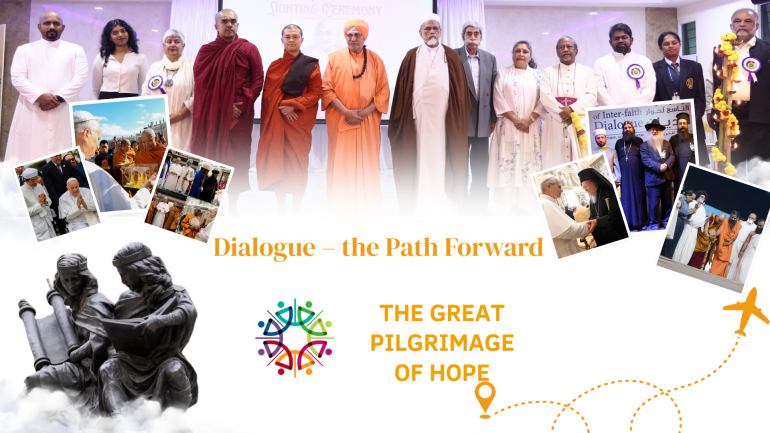Dialogue – the Path Forward: The Great Pilgrimage of Hope

The Catholic community across Asia is preparing for a significant moment of renewal as the “Great Pilgrimage of Hope” convenes in Penang, Malaysia, on November 27–30, 2025.
This gathering, envisioned as a continental journey of communion, places strong emphasis on one of the most urgent pastoral priorities of our time: dialogue with religions, cultures, and faith traditions.
In an increasingly interconnected yet divided world, the conference invites participants to rediscover dialogue not merely as a strategy, but as a way of being Church, a pilgrim Church that listens, encounters, and walks with all peoples in the spirit of fraternity and hope.
Asia: A Pluralistic Club
Asia is one of the most vibrant centres of religious plurality in the world. While it is the cradle of major global faiths such as Hinduism, Buddhism, Jainism, and Sikhism, its spiritual landscape has been further enriched by the arrival of Judaism, Christianity, Islam, Zoroastrianism, and the Bahá’í Faith. Over the millennia, the teachings, practices, and worldviews of these traditions have shaped every dimension of South Asian life. This multi-religious fabric continues to define the identity and everyday experience of the people of this region.
In the modern world, the pluralistic ethos of South Asia has acquired global relevance. With unprecedented migration and cultural exchange, societies everywhere now mirror the religious diversity long characteristic of this region. It is within this context that the Christian community is invited to reflect deeply on what it means to live the faith authentically and meaningfully.
Nostra Aetate and Interfaith Engagement
Nostra Aetate (In Our Time), the declaration of the Second Vatican Council on the Church’s relations with other religions, promulgated by Pope Paul VI in 1965, marked a profound shift in the Church’s engagement with other faith traditions. Affirming that the “Catholic Church rejects nothing that is true and holy in these religions,” the document recognises that truth and holiness are not confined to any single tradition but may be encountered wherever human beings sincerely seek the divine. This vision resonates deeply with the philosophical and spiritual heritage of South Asia.
Ultimate Truth and the Paths to the Divine
Christian philosophy teaches that all truth participates in the ultimate Truth—God. Saint Augustine emphasized that God’s eternal and unchanging truth underlies all creation, while Thomas Aquinas viewed divine truth as the source of all lesser truths. Anselm and modern thinkers highlight both the infinite nature of divine truth and humanity’s limited capacity to grasp it. Similarly, Hindu thought presents Brahman, the formless, eternal ground of existence, as the absolute Reality in which all finite truths participate. Both traditions affirm a singular, transcendent ultimate truth, with Christianity declaring it fully revealed in Jesus Christ, who embodies wisdom, love, and compassion.
Religion may be understood as the map guiding humans toward divine presence, while spirituality is the lived journey of walking that path in sincerity and freedom. Authentic dialogue with other faiths deepens Christian identity, showing how God’s grace is active in every human search for meaning. Jesus Christ, as the definitive revelation of truth, guides engagement with all peoples (Jn 14:6).
The Call to Dialogue
Building on this theological foundation, Christian life in South Asia unfolds in constant dialogue with its vibrant cultures and religions. This engagement is marked by a spirit of search, an ongoing process of mutual giving and receiving, to discern sparks of truth that lead toward the Ultimate Truth, fully revealed for Christians in Christ.
The Church’s teaching formalises this commitment. Nostra Aetate urges believers to enter into “dialogue and collaboration with the followers of other religions” to “recognise, preserve, and promote the good things, spiritual and moral,” found among them.
Pope Francis, in Fratelli Tutti, further emphasises a culture of dialogue, mutual cooperation, and reciprocal understanding as essential for building a more fraternal world. Echoing this, the Society of Jesus in Decree 5 of its 34th General Congregation affirms: “To be religious today is to be interreligious,” recognising that positive relationships with believers of other faiths are essential in a pluralistic world.
A Fourfold Model of Dialogue
In line with this vision, the Church recognises four complementary forms of dialogue:
-
Dialogue of life – daily neighbourly interaction
-
Dialogue of action – collaboration for justice and peace
-
Dialogue of theological exchange – exploring one another’s wisdom
-
Dialogue of religious experience – sharing in prayer and contemplation where appropriate
These forms reflect and deepen the interconnectedness woven into South Asian culture.
Encounter: The Christian Way in Asia
Ultimately, in a region as spiritually dense and culturally intricate as South Asia, authentic Christian living cannot remain isolated or self-contained. Dialogue, rooted in humility, mutual reverence, and a sincere search for truth, becomes the horizon within which the Gospel is both lived and proclaimed.
Engaging deeply with surrounding religions and cultures does not weaken Christian identity; rather, it purifies, enriches, and strengthens it. In welcoming the wisdom, questions, and aspirations of our neighbours, Christians participate more fully in God’s universal outreach to humanity.
Meaningful Christian life in South Asia is realised not in withdrawal but in encounter, not in suspicion but in solidarity, and not within rigid boundaries but through a shared pilgrimage toward the fullness of truth.
Pilgrimage Church
As we reflect on the rich spiritual heritage of South Asia and the Church’s deepening commitment to encounter, we look to the Great Pilgrimage of Hope with renewed expectation. The pilgrimage offers more than an event; it is an invitation to open new and creative pathways for interreligious and intercultural dialogue, grounded in humility and the sincere search for truth.
May this journey empower the Church in Asia to become ever more a pilgrim Church, walking hand in hand with peoples of other faiths, building a future where mutual respect, collaboration, and shared humanity illuminate the road toward lasting peace and the fullness of God’s truth.








